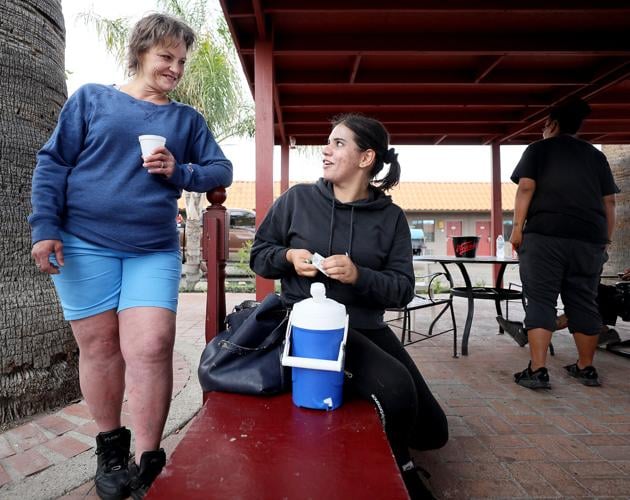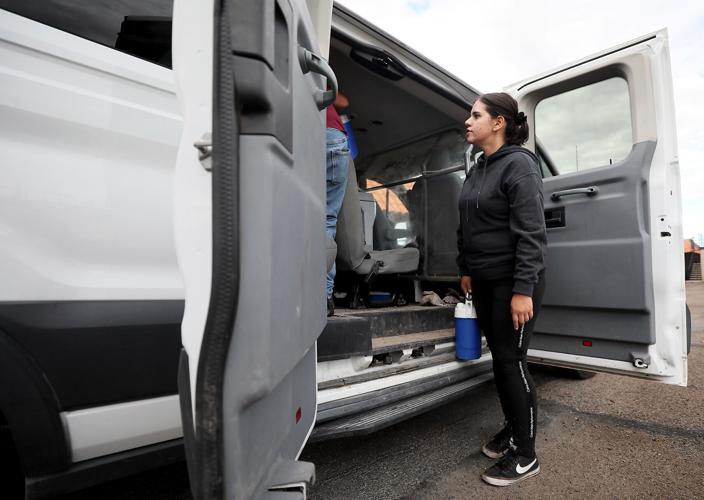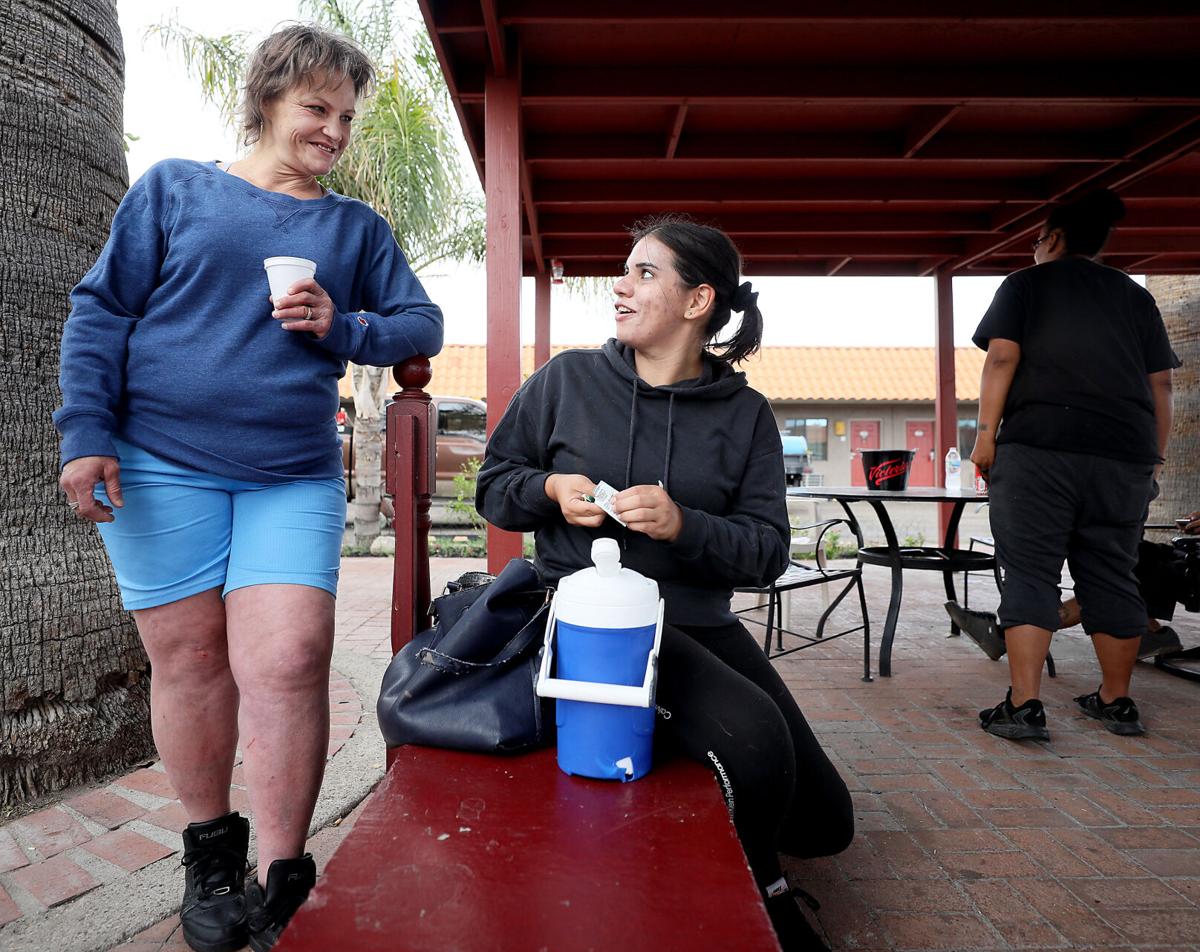On Monday shortly after 7 a.m., a dozen or so people gathered in the shaded courtyard of a former hotel on North Oracle Road, enjoying the cool morning breeze as they readied themselves for the day ahead.
Many of the residents were waiting for their ride to work, but others were there just to socialize. A pair of women smoked cigarettes and chatted, while two of residents with their dogs met up a short distance away, the pups and owners greeting one another.
People filled coolers and bottles of water in anticipation of a day spent outdoors, while another woman made trips to and from her room to find just the right toys for each of the two dogs. It was a lively scene, as the people sipped their coffee, shared snacks and socialized.
Operators say this was a typical Monday morning at the Wildcat Inn, a recently converted hotel now owned by the city that houses unsheltered individuals who used to be living in camps around town.
With 49 rooms and 62 residents as of Monday, the inn and its city operators operate on a no-barrier system. People can bring their pets and couples aren't forced to split up, both major factors that cause people to remain on the streets rather than enter a traditional shelter.
The project has been up and running for a little more than four months, but it's served as a stepping stone for dozens of residents in that time, a handful of whom have already moved into apartments or found other housing arrangements.
In a February Tucson City Council meeting, city officials presented data from the University of Arizona's Southwest Institute on Research for Women that estimated a need of 2,000 housing units to reach a "functional zero" in terms of unsheltered people.
The Wildcat Inn is one of many tools the city's Housing and Community Development Department is using to address homelessness, but it's one that supporters say could prove transformational.

Jeannette Garment leaves her room at the Wildcat Inn. Garment has been at the inn for three months after living on the streets on and off for six years. Garment was up early for Old Pueblo Community Services' Homeless Work Program.
'Exceeded my expectations'
Jeannette Garment moved into the Wildcat Inn on April 1 and was one of six residents selected by lottery to participate in Old Pueblo Community Services' Homeless Work Program on Monday. She passed out snacks and made jokes as residents waited for the van that would take them to the worksite.
"I was homeless out there off and on for six years," Garment said. "This place has far exceeded my expectations."
With the heat and monsoons, Garment said she's grateful to not be spending another summer on the streets.
"It's not safe out there weatherwise," she said.
Garment said she was skeptical when Champion and the Housing First staffers approached her about moving to the inn, but they weren't just telling her what she wanted to hear.
"It's not empty promises," she said. "I really love the staff here and they've been extremely helpful with paperwork and they'll help with going to court and be an advocate there."
Garment is on the waitlist for Section 8 housing, but said she's hopeful her voucher will come through soon. In the meantime, she's participating in outpatient substance use classes and behavioral health services and activities at SonderCare.
Garment called the Wildcat Inn and its staff a blessing, saying they've provided her with more support than she ever could have expected.
The Wildcat Inn is one of three city-owned buildings that together will house about 150 people. It's the largest of the three properties the first residents moved in Feb. 22.
Residents of the inn come primarily from three of the camps located around town: Congress and Interstate 10, an area north of Golf Links and east of South Swan Road, and West Anklam Road and North Camino Santiago.
Daily outreach to the Golf Links camp started Jan. 18, with Housing First director Brandi Champion and others working hard to sell residents on the city's Housing First approach, which includes five key facets:
- Immediate access to housing with no preconditions.
- Participant choice on where to live, what types of services to participate in, employment and personal goals.
- Services and support centered around in trauma recovery
- Individualized and participant-driven supports.
- Connection to positive social and community engagement.

The Wildcat Inn opened in February to unsheltered individuals who were living in homeless camps.
More balanced rules
The inn's five staffers perform a variety of services for residents, including working with them to sign up for housing vouchers. Some staffers also carry a caseload of other unsheltered individuals.
Allison Chappell, a management assistant with the city's Housing and Community Development Department, spends roughly $2,300 each week on food items, including non-perishables, freezer foods and produce, available to residents in the snack room during designated hours. Starbucks donates refrigerated items, and there's an on-site clothes closet and hygiene pantry available to residents.
With a "no room-visiting" policy in place for residents' individual rooms, there's a designated room for meetings and groups and second community room, stocked with an air hockey table, pingpong table, kitchen area for shared meals and more.
Old Pueblo Community Services provides jobs for residents through the Homeless Work Program and a team of nurse practitioners and behavioral health providers from El Rio and elsewhere are on site weekly to provide services, including referrals and medication refills, which are delivered to the inn.
Champion, who spent 10 years working with Old Pueblo Community Services before being hired by the city in 2020, said that when she first started at OPCS, there were many barriers in place that prevented many unsheltered individuals from wanting to participate in public housing, but that approach has changed over the years.
When residents arrive, staff searches their belongings for weapons, which will be confiscated, and drugs, which will be thrown away, but they don't search individual people. Residents are informed of the process prior to the search.
No drug use or smoking is allowed on site, but people are not barred from entry if they come back under the influence. There's a daily room check that involves a walk-through to the back of the room, but no intensive searches, Champion said.
Residents are told that paraphernalia and drugs that are visible during checks will be discarded, Champion said.
"You've got to learn how to live in your apartment and in a community setting. You can't just leave everything laying around. It's part of harm reduction," Champion said. "We're not telling you not to use, we're telling you to be discreet."
If drugs are found in a resident's room, they'll be confiscated, but the person will not be kicked out. They'll be sent to detox, but their room will be waiting for them when they return.
"It's housing first, but it's not housing only," Champion said. "We're teaching them real-life harm reduction."

'I'm not going to want to leave here'
On a recent Thursday, as the Star spoke to Champion and Chappell in the inn's front office, and older man and woman came inside from the late-morning heat. They said a homeless outreach team member had sent them over and was supposed to call ahead. They had housing ready shortly, maybe even that day, but with dangerous heat expected that day, the outreach worker didn't want them outside any longer than necessary, they said.
The man, an amputee, poured himself some fruit drink as one of the office's staffers worked quickly to get paperwork and a room key together.
The trio went outside to fill out the forms, and within 15 minutes, the process was done.
The woman came inside to get another drink before heading off to their room, and talked a little bit about her life. At 69 years old, she said she'd been homeless several years and talked about how her son was murdered when she was younger. The man she was with was not her partner, she said, but he looked out for her like a brother. Champion and Chappell listened closely, telling the woman she was welcome and safe no matter their relationship status.
"I'm not going to want to leave here," the woman said. "You're the first people I actually met who care."
Fifty-five people from the Golf Links camp ended up coming to live at the Wildcat Inn, with a handful already moving out into their own apartments. The average anticipated stay is between 90 and 120 days, but Champion says they know there are residents that will need to stay longer.
The outreach Champion and Chappell were doing is different than the city's homeless protocol for clearing encampments., but rather an effort to get people into housing before the camps are cleared. They would take peers out into the field to share their lived experiences, and came back day after day after day, Champion said.
"I think the fact that we're very real makes us relatable to the folks here and I think it makes it a little bit easier for them to want to trust us," Chappell said.
There's a community room and residents participate in managed mediation to resolve disputes. There's a behavioral contract process if they're caught breaking rules so that accountability is built into place.
"They're learning how to live in a community and learning to do it peacefully," she said. "We've had two transgender people that have come here. They're peaceful here. Protected, safe and not getting beat up."
There's already a Wildcat baby, with one resident giving birth in early June. The couple has an open case with the Department of Child Safety and their first child, due to being homeless, but having an address allowed them to take this baby home from the hospital, Champion said.

Brittany Thayer, a resident at the Wildcat Inn, waits her turn to get into the Old Pueblo Community Services van which will take her to a work site for the day as part of the Homeless Work Program.
Setting residents up for success
The idea is for the community to be as close to an apartment complex or neighborhood as possible to prepare residents for future housing, Champion said.
"We want them to be successful when they get into their apartment, so there has to be some sort of boundaries and rule-setting and rule-following at some point," Chappell said. "It's truly like a happy medium of what we're able to accomplish and do."
Champion and Chappell are also trying to bring in as many services as possible, including University of Arizona students to enroll residents in the school's longstanding Health Home Hope program. The project aims the connect people experiencing homelessness with behavioral health, physical health and housing support.
There are also "Court in the courtyard" so that residents can easily quash warrants, since people with active warrants can't get housing vouchers.
Chappell said that she believes most residents have limited their drug use since moving in, and it's not because of the rules.
"It's because they now have something to lose," she said. "Not all of them care, but the people who aren't here for the right reasons and aren't going to use this opportunity for what it is weed themselves out really quickly."
The rest, she said, are successful.
"Those are the ones that you want to work so hard for, because they're ready and trying," Chappell said. "It's a feel-good job. A lot of people look at homelessness like they're throwaway people, but the people here have incredible stories."
Another Wildcat Inn resident, Matthew, said he was hesitant to move in at first, but the situation has "turned out great."
"It helps that these folks have been there," he said of the inn's staff, who are people with lived experience.
Matthew had been unsheltered for the past nine years prior to moving in, but after a week at the Wildcat Inn, he was enrolled in truck driving school and had received a grant to cover the cost.
The four week course is set to start on July 11, after which Matthew can get his license and get on the road with his dog.
"The hardest part was making the decision to do it," he said of his involvement with Housing First, adding that while he's been happy with all that's happened since he moved in, at times, still can't believe it's all real. "I still have to come outside a few times a night to make sure the moon is still here."







